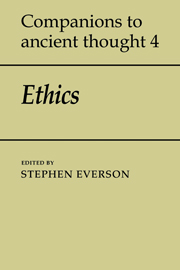Book contents
- Frontmatter
- Contents
- 1 Introduction: virtue and morality
- 2 Pre-Platonic ethics
- 3 Platonic ethics
- 4 Aristotle on nature and value
- 5 Some issues in Aristotle's moral psychology
- 6 The inferential foundations of Epicurean ethics
- 7 Socratic paradox and Stoic theory
- 8 Doing without objective values: ancient and modern strategies
- 9 Moral responsibility: Aristotle and after
- Bibliography
- Index of names
- Index of passages discussed
- Index of subjects
3 - Platonic ethics
Published online by Cambridge University Press: 05 June 2012
- Frontmatter
- Contents
- 1 Introduction: virtue and morality
- 2 Pre-Platonic ethics
- 3 Platonic ethics
- 4 Aristotle on nature and value
- 5 Some issues in Aristotle's moral psychology
- 6 The inferential foundations of Epicurean ethics
- 7 Socratic paradox and Stoic theory
- 8 Doing without objective values: ancient and modern strategies
- 9 Moral responsibility: Aristotle and after
- Bibliography
- Index of names
- Index of passages discussed
- Index of subjects
Summary
The fundamental question of Platonic ethics is ‘How should one live?’ (Republic 1.352d, Gorgias 500c). That question is not to be understood as ‘What is the morally best way to live?’, as is shown by the fact that in Rep. 1 an appropriate, though in Plato's view false, answer to it is that given by Thrasymachus, namely that one should live by emancipating oneself to the best of one's ability from the restraints of morality with a view to the furtherance of one's own interest. Rather it is to be understood as ‘How may one achieve the life which is, objectively, but from the point of view of one's own interest, the most worth living?’ (Rep. 1.344e). The Greek term for the achievement of such a life is eudaimonia (literally ‘having a favourable guardian spirit’ (daimōn)), conventionally translated ‘happiness’, but in view of its objective character better rendered ‘blessedness’ or ‘well-being’. According to Aristotle (Nicomachean Ethics (EN) 1095318–20) it was universally acknowledged (a) that eudaimonia was the supreme good and (b) that the term meant ‘living well’ and ‘doing well’; nothing in the texts of Plato suggests that his use of the term conflicts with these claims. In the same passage Aristotle tells us that there were substantive disputes about what living well amounted to, some holding, for example, that it consists in acquiring wealth, others that it consists in a life of honour or of intellectual achievement; Plato depicts such substantive disputes in Socrates’ confrontations with Thrasymachus in Rep. 1 and Callicles in the Gorgias.
- Type
- Chapter
- Information
- Ethics , pp. 49 - 76Publisher: Cambridge University PressPrint publication year: 1998
- 3
- Cited by



